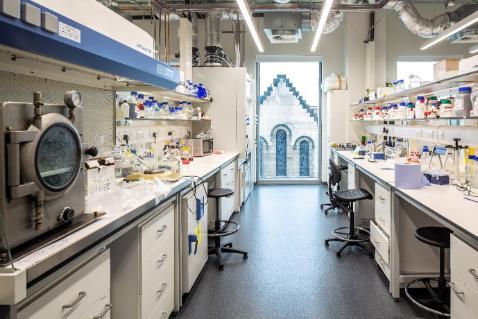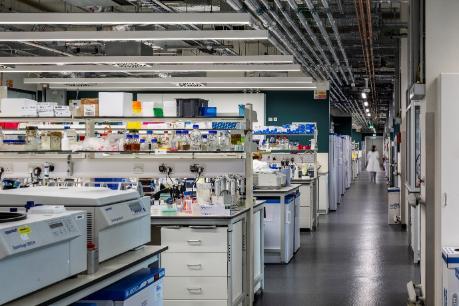Keltic Pharma Therapeutics
Using world-class expertise to unlock new opportunities in drug discovery.
Keltic Pharma Therapeutics is a recent UofG spin-out venture, founded by Prof Andrew Tobin, Prof Graeme Milligan (both School of Molecular Biosciences) and Prof Andrew Jamieson (School of Chemistry). The team aims to develop the next generation of malaria treatments, as well as utilising their combined research expertise to develop new therapeutics against ‘undruggable’ targets. Since the company spun out, they have expanded their portfolio to a variety of health areas, ranging from malaria treatments to ways of addressing asthma and neurodegenerative diseases (figure 1).
The TRI awarded early-stage translational funding from the Medical Research Council’s Confidence in Concept (MRC CiC) grant, now Impact Accelerator Accounts (IAA). This investment, as well as support from external partners, paved the way for the spin-out company, which has now secured over £9.5 million in follow-on research funding and over £0.5 million in-kind contributions from collaborators.

Figure 1. Key areas of focus in the Keltic Pharma therapeutic portfolio, including Malaria treatments, platforms to evaluate interaction mechanisms of target proteins, as well as neurodegeneration and asthma treatment options.
Keltic Pharma was formed following fundamental research in Prof Tobin’s group (figure 2) which showed that inhibiting PfCLK3, an essential protein found in the malaria parasite, could kill the parasite at multiple stages of its life cycle. This would prevent transmission and promised the potential for prevention and treatment of the disease. The company has obtained additional funding from the EU Malaria Fund (€5M) and the Bill and Melinda Gates Foundation ($4.3M) to develop inhibitors of PfCLK3 as new first-in-class malaria treatments.
Furthermore, the founders of Keltic Pharma aim to draw on their extensive knowledge of a class of cell surface proteins known as G Protein-Coupled Receptors (GPCRs) which are historically successful drug targets. However, a subclass of these proteins have been described as ‘hard to target’ due to the structure of their ligand binding pocket. The Keltic Pharma team aim to develop and deploy a novel drug discovery platform (PEP-SMOL), which allows drug-like molecules to be identified against these ‘undruggable’ targets. They hope to use this platform in collaboration with partner organisations to develop new targets and treatments for diseases with unmet clinical needs.

Figure 2. The lab where the Keltic Pharma journey began.
Following the identification of PfCLK3 as an essential protein for malaria parasite survival, the team collaborated with GSK to screen ~30K compounds against PfCLK3 and identified several selective inhibitors with promise for future drug development. This has led to significant interest from a number of additional collaborators, including the European Lead Factory (ELF), and the Bill & Melinda Gates Foundation (BMGF), who have since supported a series of additional compound screens.
Funding from the MRC CiC grant awarded by the TRI, supported the production of large quantities of PfCLK3 protein required for these screens. This included a highly successful DNA encoded library screen by the BMGF which has resulted in over $4M additional funding to progress through hit-to-lead and lead optimisation phases.
MRC CiC funding covered the initial salary and consumables costs to enable early-stage de-risking and proof of concept development of the underlying research that supported the establishment of Keltic Pharma Therapeutics as a spin-out company. The company were one of the first occupiers of the University’s flagship research hub, the Advanced Research Centre (ARC) (figure 3) and have achieved success in securing additional development funds.
Keltic Pharma have now grown to a team of 8 skilled biologists and chemists, and received a €5M Venture Loan from the European Union Malaria Fund (EUMF) to launch drug discovery programmes for malaria and against other GPCR targets.

Figure 3. Keltic Pharma Therapeutics headquarters at the ARC, UofG.
The activities of Keltic Pharma and the University’s underlying research have generated significant IP, including patents protecting the stapled peptides and covalent inhibitors (in partnership with collaborators from the School of Chemistry), for which Keltic has been granted exclusive licences by the University. The company is now filing patents for their own generated compounds, and they hold trade secrets for their PEP-SMOL drug discovery platform.
The University’s IP & Commercialisation Team have supported the Keltic Pharma throughout their journey from academic research to spinout including the filing of patent rights, managing the formation of Keltic Pharma and transfer of the UofG IP and trade secrets to the company; they also supported securing of the €5M Venture Loan from the EUMF and provision of a convertible loan to help establish the company.
The journey of Keltic Pharma showcases how ground-breaking academic research conducted by field leaders within UofG (figure 4), combined with dedicated translational support, can result in incredible success through fundraising, collaborations and scientific discovery.

For more information, contact info@keltic-pharma.com or find updates on the Keltic Pharma website. For information on translational funding opportunities, or ways to progress your project towards impact, please contact the TRI team.
Funding Sources
Internal Funding awards:
2018:
- £25K MRC Proximity to Discovery (P2D) award
2019:
- £81.5K MRC Confidence in Concept (CiC) award (managed by the TRI)
External funding awards
2019:
- $500K award from the Bill and Melinda Gates Foundation
2021:
- €5M EURO Venture Loan from the European Union Malaria Fund (EUMF)
2022:
- $2.7M award from the Bill and Melinda Gates Foundation
2023:
- $1.6M award from the Bill and Melinda Gates foundation
In-kind contributions:
- €500K in-kind contributions from the European Lead Factory to screen 500K compounds against PfCLK3

